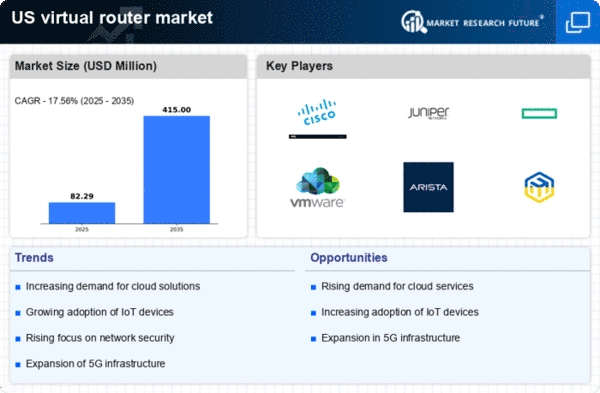Increased Focus on Cost Efficiency
Cost efficiency remains a critical driver for the virtual router market. Organizations are continually seeking ways to reduce expenses associated with network infrastructure. Virtual routers, which eliminate the need for expensive hardware, present a viable solution. By leveraging software-based routing, companies can achieve substantial savings on both capital and operational expenditures. The virtual router market is expected to see a growing adoption of these solutions, as businesses recognize the financial benefits of transitioning to virtualized networking environments. This trend is likely to accelerate as more organizations prioritize budget-friendly alternatives.
Rising Demand for Network Virtualization
The virtual router market experiences a notable surge in demand due to the increasing need for network virtualization solutions. Organizations are transitioning from traditional hardware-based routers to virtual routers, which offer enhanced flexibility and scalability. This shift is driven by the desire to optimize network resources and reduce operational costs. According to recent data, the market is projected to grow at a CAGR of approximately 15% over the next five years. The virtual router market is thus positioned to benefit from this trend, as businesses seek to streamline their network infrastructure and improve overall performance.
Growth of Remote Work and Distributed Teams
The rise of remote work and distributed teams has significantly impacted the virtual router market. As organizations adapt to flexible work arrangements, the need for reliable and secure network solutions becomes paramount. Virtual routers facilitate seamless connectivity for remote employees, enabling them to access corporate resources securely. This trend is reflected in the increasing investments in virtual networking technologies, with the market expected to reach $5 billion by 2026. The virtual router market is likely to thrive as companies prioritize robust networking solutions to support their remote workforce.
Advancements in Network Management Technologies
Technological advancements in network management are driving the evolution of the virtual router market. Innovations such as artificial intelligence and machine learning are being integrated into virtual routers, enhancing their capabilities in traffic management and performance optimization. These advancements allow for more efficient network operations, reducing downtime and improving user experience. The virtual router market is witnessing a shift towards intelligent networking solutions, which are anticipated to account for a significant share of the market by 2027, as organizations increasingly seek to leverage these technologies for competitive advantage.
Regulatory Compliance and Data Privacy Concerns
The virtual router market is increasingly influenced by regulatory compliance and data privacy concerns. As organizations face stringent regulations regarding data protection, the demand for secure networking solutions rises. Virtual routers offer enhanced security features, enabling businesses to comply with regulations such as GDPR and HIPAA. The virtual router market is thus positioned to grow as companies invest in technologies that ensure data integrity and security. This focus on compliance is expected to drive innovation within the market, as vendors develop solutions that address these critical concerns.

















